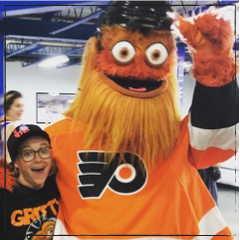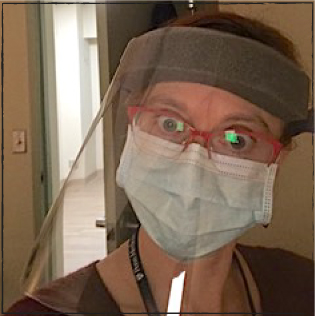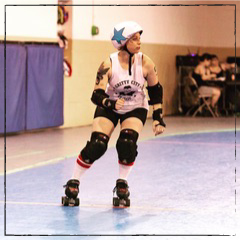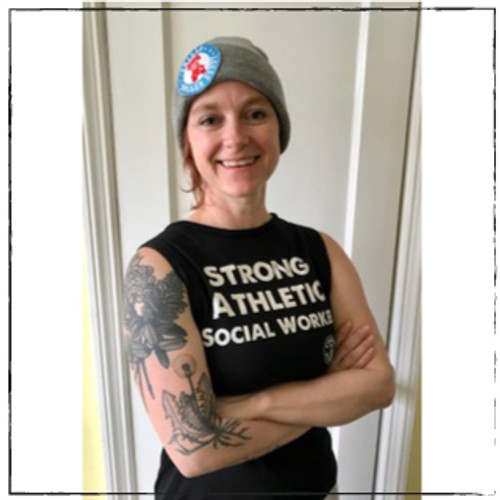The Road to Becoming a Strong Athletic Social Worker
Posted by Ashley J. Carraher aka Brash Knuckles of Philly Roller Derby on Oct 26th 2020
Fred Rogers, beloved television personality, is known for this famous quote, “When I was a boy and I would see scary things in the news, my mother would say to me, ‘Look for the helpers. You will always find people who are helping.’” Being a helper is at the core of social work. It can often feel difficult in “pull yourself up by your bootstraps” patriarchal America to admit that one needs assistance. Vulnerability and support are essential for growth but are often strongly avoided and have a connotation of being a weaknesses. Being a social worker means providing a voice to help advocate for those who have been marginalized, ignored, or just simply require guidance in obtaining resources. Being a helper has been a core piece of my identity and I carry it into my personal life with a sport that has become my best self-care strategy; roller derby.

Becoming a social worker was almost inevitable. After graduating from college, I taught four years of English in high school and middle school. Many lesson plans, parent-teacher conferences, and sleepless nights later, I felt jaded and burned out; experiencing a quarter-life crisis moment of existential questioning. All I knew deep in my soul was that I possessed a strong desire to understand people and help support them along life’s rough path. I wasn’t even sure what a social worker did; the variety of hats, bandanas, flower crowns, and helmets social workers wore were vast and often confusing. A therapist can be a social worker? I thought that was a counselor… or a psychologist? Do social workers really “tear families apart” by putting children in foster care? Even more difficult was sharing my thoughts regarding pursuing such a degree; often the well-intended comments from others were along the lines of “Social work huh… you wouldn’t make much money in that career, you know that?” Regardless of outside opinions and suggestions, I worked rigorously in graduate school, earning my MSW (Master’s in Social Work) in 2012.
For the past eight years, I have worn an entire costume store’s worth of worn out hats, cracked helmets, and broken crowns. I have been a “life plan” coach in a foster care agency, a school therapist for adolescents with special needs, a counselor for cis-gender females at a therapeutic residential home, a mobile therapist providing in-home therapeutic services, a clinician in a children’s psychiatric hospital, a “healthcare specialist” working with individuals with terminal illness, worked the overnight shift in a children’s emergency department, and currently am serving as a lung transplant/pulmonary social worker where I hope to remain. I have counseled individuals on how to leave an abusive relationship, held a crying mother as her child lay dying in a trauma bay, and entered homes that could have clearly qualified for the television show “Hoarders.” I have had to file countless child abuse reports, become an impromptu marriage counselor, and talk to terminally ill clients about what their wishes were when they would eventually require hospice care. I have advocated in family court, stood in roach-infested homes, and taught sex education curriculum to children with autism. Currently I work in a hospital during the COVID-19 pandemic, where I often feel I am going into battle with my face shield, face mask, gloves, and gown.

My life completely changed when I joined Philly Roller Derby’s “Cheeseskates” new skater program in 2018. I’ve never really called myself an “athlete;” in high school I preferred the band room over the weight room, and I picked daisies when playing center field. But once I laced up the skates, donned the pads, and put on a completely new helmet (not broken and with no cracks visible), I immediately knew I never wanted to take it off. Roller derby is a place where I can use my body as a vehicle through which to expel the traumatic work I encounter and bring in healthy endorphins alongside my supportive teammates. Individuals who work in helping industries such as the medical field, food service, and education often give and give and give of themselves and never seem to be able to recharge their “giving” batteries. This challenging sport is one in which you can recharge all your batteries; physically, mentally, and emotionally.

I’ve also met and become friends with individuals from all walks of life that I would never have crossed paths with otherwise. I have been able to check myself on my own prejudices regarding how others present themselves in the world; how it impacts the way I was conditioned in childhood and the way I help serve others now in adulthood. Because of Philly Roller Derby’s inclusive atmosphere, I have strongly encouraged my department at work to ask patients as well as coworkers for their pronouns. I have helped parents understand that their children do not need to adhere to gender-stereotyped behaviors. The lens through which I see the world has been widened into a broader spectrum where I feel I can be a better social worker and a better human.
Without roller derby at this time of quarantine, I have truly realized how important the activity is for myself and others, and how grateful I am to have the opportunity to be involved in such a welcoming community. Although I am currently not able to step onto a track and rock the skates, wear the pads, or don the helmet (now covered in stickers), I know this temporary pause will only reinforce what it means to me to be a strong, athletic social worker.
-Ashley J. Carraher, MSW, LSW
Philly Roller Derby - “Brash Knuckles” #5
From Strong Athletic
We were asked to make the Strong Athletic Social Worker Shirts in 2019 when the world was still "normal", and by normal we mean pre COVID-19. Back in the days when the average workday load of most social workers was very busy and often times over booked, but they didn't have the strain that came with needing to stay safe from a global pandemic. Since that time, social workers as a profession have been asked to do even more than before. Depending on their role as a a social worker, their job requires them to have face-to-face interaction with the people that they serve. These meetings are sometimes in private homes, other times in hospital rooms or at schools. The Corona Virus has changed how humans interact and the lives of social workers have had to change with the necessary restrictions that have been put into place. Strong Athletic wanted to recognize the adaptability of social workers and the current pressures they are working under as they help the world's most vulnerable during this world wide pandemic. We know that we will never be able to put into words how truly grateful we are to have all of the social workers in the world, but we hope that if you're a social worker you'll accept our gratitude and appreciation.
The Strong Athletic Social Worker shirts were made as a limited edition design in 2019. If you are part of a group of social workers who would like to place an order for these shirts, get in touch and we'll send you details for how to place a special order.
Keywords: social workers are an important profession, social workers who play sports, social worker athletes, athletes who are social workers, social workers who workout, social workers in roller derby, social workers in fitness, shirts about being a social worker, shirts for social workers


